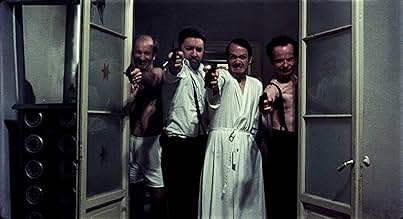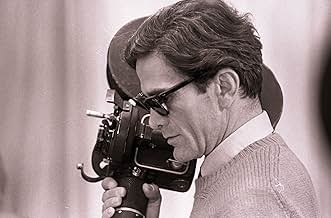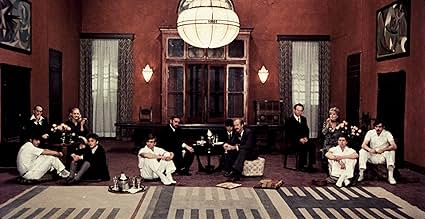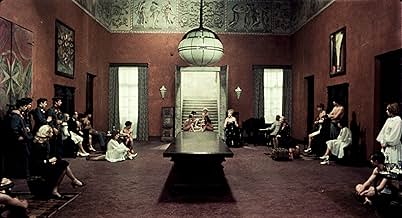
Lireclip3 min 12 s
Regarder If You Liked Terrifier 3, Watchlist These Endurance Horror Classics
En Italie, au cours de la Seconde Guerre mondiale, quatre libertins fascistes rassemblent neuf jeunes hommes et jeunes filles et les soumettent à cent vingt jours de torture physique, mental... Tout lireEn Italie, au cours de la Seconde Guerre mondiale, quatre libertins fascistes rassemblent neuf jeunes hommes et jeunes filles et les soumettent à cent vingt jours de torture physique, mentale et sexuelle.En Italie, au cours de la Seconde Guerre mondiale, quatre libertins fascistes rassemblent neuf jeunes hommes et jeunes filles et les soumettent à cent vingt jours de torture physique, mentale et sexuelle.
- Prix
- 1 victoire au total
Uberto Paolo Quintavalle
- Eccellenza
- (as Umberto P. Quintavalle)
Hélène Surgère
- Signora Vaccari
- (as Helene Surgere)
Histoire
Le saviez-vous
- AnecdotesDespite the grim subject throughout the film, in an interview on the second disc of the Criterion Collection box set, actress Hélène Surgère claimed the mood was actually rather jovial on the set and that none of the teenage actors were actually harmed or traumatized. She said the abundance of teenagers who had never acted before led the mood to be happy and at times, even fun, with the cast often playing practical jokes on each other. She also said that the movie was literally "made" in the editing room and the filmmakers had no idea how grim a movie it was until they saw the finished product at the premiere.
- GaffesWhen the Duke kisses several victims during Sergio and Renata's wedding, some victims and Ezio begin to laugh, off the character.
- Générique farfeluEssential Bibliography: Roland Barthes: 'Sade, Fourier, Loyola' (Editions du Seuil); Maurice Blanchot: "Lautréamont et Sade' (Editions de Minuit; in Italy Dedalo Libri); Simone de Beauvoir: 'Faut-il brûler Sade' (Editions Gaimard); Pierre Klossowski: 'Sade mon prochain, le philosophe scélérat' (Editions du Seuil; in Italy SugarCo Edizioni); Philippe Sollers: 'L'écriture et l'experience des limites' (Editions du Seuil)
- Autres versionsThe film was rejected for cinema by the BBFC in 1976 and a private showing of the uncut version at the Old Compton Cinema Club in London's Soho resulted in a police raid and confiscation of the movie. A heavily edited version - minus 6 minutes of footage including scenes of torture, homosexuality and excrement eating, and including a 4 minute prologue describing the history of the town of Salo - was later prepared by UK censor James Ferman for club showings. The film was finally passed completely uncut for cinema and video in the UK in December 2000.
- ConnexionsEdited into Histoire(s) du cinéma: Une histoire seule (1989)
- Bandes originalesPrelude in C minor
(uncredited)
Composed by Frédéric Chopin (uncredited)
Played by Arnaldo Graziosi (uncredited)
Commentaire en vedette
Pasolini made it quite clear in several texts that this is not an anti-fascist film, but rather that fascism is a symbol for something far more pervasive. He ultimately saw himself as a committed director, and thus all of his historical films are about the present, and this film was made in the 70's, not in the 40's. It is rather an anti-bourgeois film. (Pasolini's political enemies at the time were not fascists at all, but the Christian Democrats)...Furthermore it is NOT a defense of Sade, but an apology for his earlier writings and films which mythicized acts of violence and glorified them as the pure, unconscious, pre-verbal expression of the subproletariat. However Pasolini saw the riots of the bourgeois students in 1968 as nihilistic acts of revolt, not revolution--a revolt of the Bourgeoise against itself, as his poetry makes clear. He watched in horror as he saw his vision of true revolution twisted into a childish and merely destructive tantrum against the previous generation. And so it is the Bourgeoise, symbolized by Fascism, which he represents and condemns in Salo, in the guise of what he considered to be a medieval morality play. And it is in this context that he apologizes for having made statements like "Only a bloodbath can save the world" (1962), which is quoted in the film. Yet, like everything else, it has been appropriated by the bourgeoise, who misinterpret it first as Nietzsche, then as St. Paul, until it gets reduced to a merely absurdist Dada interpretation. The characters are continually misinterpreting the many structuralist citations, because they have no history. History has been destroyed, and thus Pasolini is trying to re-introduce it in the film. The revolution, by 1968, was impossible, as there was nobody left to fight it. The bourgeoise, Pasolini lamented, had subsumed everything into itself-there was no "other", only a technological god-like and all-inclusive power structure. But what is most shocking is that it is the Sadean libertarianism and the permissivness of that class that Pasolini finds most disturbing. He held that the permissiveness of the "anarchy of power" was more tyrannical than repression. He was most traumitized, oddly, by the increasing tolerance of homosexuals. And so truely Pasolini takes the side of Dante, not Sade. And finally, its ultimately a film about misinterpretation. What the characters say and what they do (as in Sade) are incongruent. He knew that he was to be misunderstood by his Bourgeois audience, as it misunderstood itself, Pasolini said that it was intrinsic that Salo remain enigmatic (on the model of Dante), and this is the film's real genius. Judging by most of these reviews, Pasolini made his point.
- Ariel6
- 21 nov. 2001
- Lien permanent
Meilleurs choix
Connectez-vous pour évaluer et surveiller les recommandations personnalisées
Détails
- Date de sortie
- Pays d’origine
- Langues
- Aussi connu sous le nom de
- Salò, or the 120 Days of Sodom
- Lieux de tournage
- sociétés de production
- Consultez plus de crédits d'entreprise sur IMDbPro
Box-office
- Brut – à l'échelle mondiale
- 1 808 595 $ US
- Durée1 heure 57 minutes
- Mixage
- Rapport de forme
- 1.85 : 1
Contribuer à cette page
Suggérer une modification ou ajouter du contenu manquant

Lacune principale
What is the streaming release date of Salo: Les 120 Jours de Sodome (1975) in Brazil?
Répondre
![Trailer [OV]](https://m.media-amazon.com/images/M/MV5BYTczYWExODUtNmQ3NC00MzRhLTkwMGQtNzRjM2M5ZGQzYmVkXkEyXkFqcGdeQXRyYW5zY29kZS13b3JrZmxvdw@@._V1_QL75_UX500_CR0)

























